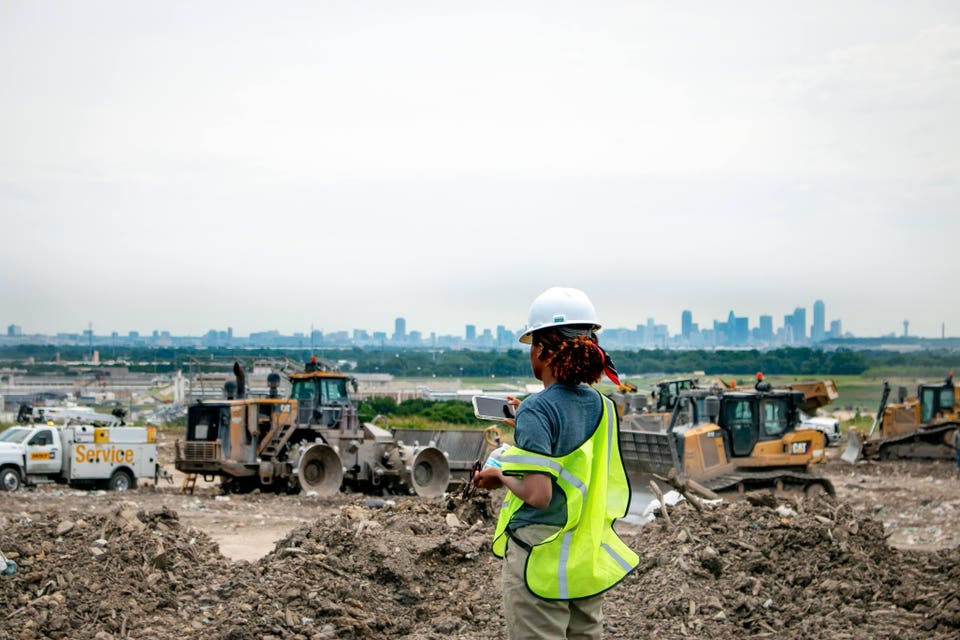Marcela Ulloa Murillo in the landfill of the City of Grand Prairie, Texas, USA in 2022. Latin America is facing a waste crisis—now researchers are looking for a way to turn wastewater sewage sludge into useful material for farmers. Over 540,000 metric tonnes of municipal waste are generated in Latin America and the Caribbean every day and that’s projected to increase by at least a quarter by 2050, according to a United Nations report .
Marcela Ulloa-Murillo , a PhD student at the Czech University of Life Sciences Prague ( CZU ) and a junior researcher in Technological Centre of Catalonia (Eurecat) says she’s researching how to use pyrolysis to turn hazardous and toxic substances contained in waste materials into compounds useful for agriculture. “Pyrolysis is a process where the thermal decomposition of biomass in an oxygen-free or oxygen-deficient atmosphere is carried out,” she says, which produces gases, condensable vapours (bio-oil) and biochar, a charcoal-like solid . “My main interest is biochar production, which is intended specifically for application to agricultural soils as a soil amendment to support plant growth and development,” she says.
Ulloa-Murillo explains that she’s evaluating the output of different pyrolysis conditions, such as time, temperature, and temperature heating rate, with the ultimate aim of applying pyrolysis to sewage sludge treatment, which is currently isn’t applied. “The most significant opportunity of this process is the increasing interest in the development of treatment alternatives for sewage sludge, which can be regarded as valuable waste, producing valuable by-products that can be used in agricultural land with limited risks,” she says, adding that she hopes to help solve the severe economic, social, and environmental impacts of inadequate solid waste management. Marcela Ulloa Murillo, PhD Student in Agricultural specialization in the Czech University of Life .
. . [+] Sciences Prague (CZU).
and Junior Researcher in Technological Centre of Catalonia – Eurecat. Growing Up In Cali, Colombia Ulloa-Murillo grew up in Cali, a southern Colombian city known for its Pacific culture. “Like many Afro-Colombian kids, I could only dream about higher education, but I wanted to go to college because I wanted to have a better life, although I didn’t know exactly how education could get me there,” she says, “Despite the fact that I am a first-generation college student, my mum and family have always encouraged me during my educational path; being a black woman in STEM is not easy, but it is fantastic to be a role model for black women and girls that can see in me the reflection of something that they can accomplish.
” Ulloa-Murillo graduated as a sanitary and environmental engineer at the Universidad del Valle , Cali, before going on to further study overseas. She explains that there’s is an urgent need within science to hear the voices of people coming from different backgrounds, training and experiences. “From my perspective, it is urgent to integrate the knowledge from scientists coming from the Global South not only to reduce the gap of inclusiveness and diversity but also to increase the international impact that scientific production made in the global south can have,” Ulloa-Murillo says, “Scientists from the Global South could bring scientific research and advances with positive effects in the long term on the economic and environmental development of the region and could provide valuable evidence to develop policies that fit the local conditions perfectly and would allow adapting technical practice and development.
” Marcela Ulloa Murillo, in the lab part of the Department of Agro-environmental chemistry and plant . . .
[+] nutrition in April 2023. Mexican Biochar Research Another researcher in Latin America working on biochar is Brazil’s Sara de Jesús Duarte , Research and Development Leader for The Next 150, who has a PhD in Soil and Plant Nutrition. The research of de Jesús Duarte is focused on working with Mexican farmers to test soils using biochar: the same carbon-rich material showing promise in increasing water retention and fertility.
“This opportunity has the potential to generate significant impact by increasing awareness and understanding of biochar among the local farming community, which could lead to more sustainable farming practices,” she says, “This project is of great importance, as its direct impact extends to approximately 23,000 farmers in the state of Guanajuato, Mexico, and will serve as a model for the large-scale use of biochar enriched and non-enriched with microorganisms in Vertisols. ” Her “on-field experiment” has been running since March 2023 on two farms in Guanajuato, Mexico, to demonstrate the potential of biochar to increase water retention and soil fertility, while reducing agricultural production costs. .
From: forbes
URL: https://www.forbes.com/sites/andrewwight/2024/01/12/how-can-you-turn-latin-americas-sewage-into-help-for-farmers/



